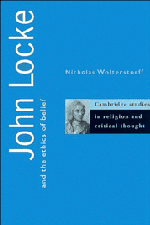1 - Rationality in everyday life
Published online by Cambridge University Press: 05 July 2011
Summary
“We should not judge of things by men's opinions, but of opinions by things.”
(Conduct of the Understanding, §24; Works 11, 363).“God has made the intellectual world harmonious and beautiful without us; but it will never come into our heads all at once; we must bring it home piece-meal, and there set it up by our own industry, or else we shall have nothing but darkness and a chaos within, whatever order and light there be in things without us.”
(Conduct of the Understanding, §38; Works 11, 385)THE VISION: LET REASON BE YOUR GUIDE IN BELIEVING
Introduction
Early in 1671, John Locke had a discussion with some five or six friends in his apartment at Exeter House in London on matters of morality and revealed religion. The discussants, says Locke, “found themselves quickly at a stand by the difficulties that arose on every side. After we had awhile puzzled ourselves, without coming any nearer a resolution of those doubts which perplexed us, it came into my thoughts that we took a wrong course, and that before we set ourselves upon enquiries of that nature it was necessary to examine our own abilities, and see what objects our understandings were or were not fitted to deal with” (Essay, Epistle to the Reader). This thought, says Locke, “was that which gave the first rise to this Essay concerning the Understanding” (1,1,7).
- Type
- Chapter
- Information
- John Locke and the Ethics of Belief , pp. 1 - 158Publisher: Cambridge University PressPrint publication year: 1996



